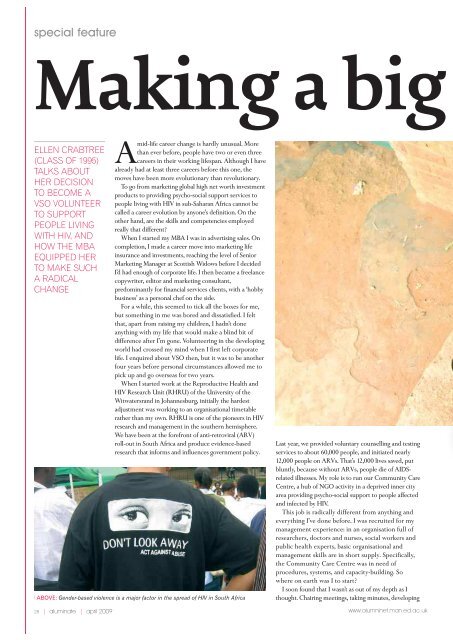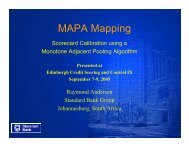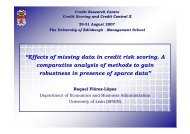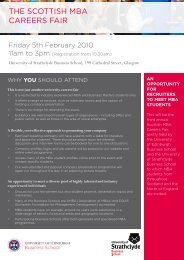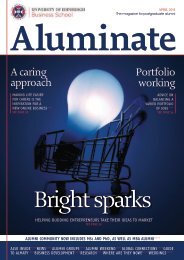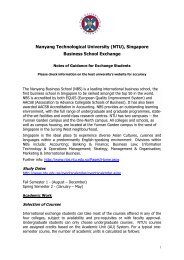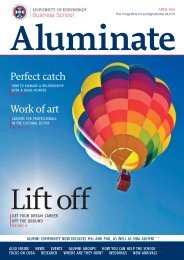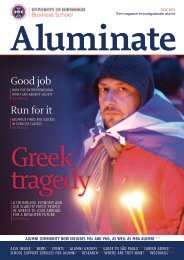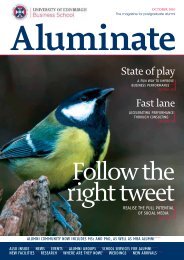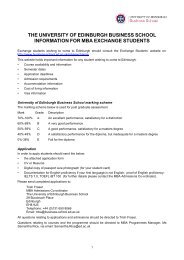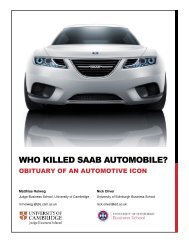to thewind? Caution - University of Edinburgh Business School
to thewind? Caution - University of Edinburgh Business School
to thewind? Caution - University of Edinburgh Business School
Create successful ePaper yourself
Turn your PDF publications into a flip-book with our unique Google optimized e-Paper software.
special featureMaking a big changeELLEN CRABTREE(CLASS OF 1995)TALKS ABOUTHER DECISIONTO BECOME AVSO VOLUNTEERTO SUPPORTPEOPLE LIVINGWITH HIV, ANDHOW THE MBAEQUIPPED HERTO MAKE SUCHA RADICALCHANGEAmid-life career change is hardly unusual. Morethan ever before, people have two or even threecareers in their working lifespan. Although I havealready had at least three careers before this one, themoves have been more evolutionary than revolutionary.To go from marketing global high net worth investmentproducts <strong>to</strong> providing psycho-social support services <strong>to</strong>people living with HIV in sub-Saharan Africa cannot becalled a career evolution by anyone’s definition. On theother hand, are the skills and competencies employedreally that different?When I started my MBA I was in advertising sales. Oncompletion, I made a career move in<strong>to</strong> marketing lifeinsurance and investments, reaching the level <strong>of</strong> SeniorMarketing Manager at Scottish Widows before I decidedI’d had enough <strong>of</strong> corporate life. I then became a freelancecopywriter, edi<strong>to</strong>r and marketing consultant,predominantly for financial services clients, with a ‘hobbybusiness’ as a personal chef on the side.For a while, this seemed <strong>to</strong> tick all the boxes for me,but something in me was bored and dissatisfied. I feltthat, apart from raising my children, I hadn’t doneanything with my life that would make a blind bit <strong>of</strong>difference after I’m gone. Volunteering in the developingworld had crossed my mind when I first left corporatelife. I enquired about VSO then, but it was <strong>to</strong> be anotherfour years before personal circumstances allowed me <strong>to</strong>pick up and go overseas for two years.When I started work at the Reproductive Health andHIV Research Unit (RHRU) <strong>of</strong> the <strong>University</strong> <strong>of</strong> theWitwatersrand in Johannesburg, initially the hardestadjustment was working <strong>to</strong> an organisational timetablerather than my own. RHRU is one <strong>of</strong> the pioneers in HIVresearch and management in the southern hemisphere.We have been at the forefront <strong>of</strong> anti-retroviral (ARV)roll-out in South Africa and produce evidence-basedresearch that informs and influences government policy.| ABOVE: Gender-based violence is a major fac<strong>to</strong>r in the spread <strong>of</strong> HIV in South AfricaLast year, we provided voluntary counselling and testingservices <strong>to</strong> about 60,000 people, and initiated nearly12,000 people on ARVs. That’s 12,000 lives saved, putbluntly, because without ARVs, people die <strong>of</strong> AIDSrelatedillnesses. My role is <strong>to</strong> run our Community CareCentre, a hub <strong>of</strong> NGO activity in a deprived inner cityarea providing psycho-social support <strong>to</strong> people affectedand infected by HIV.This job is radically different from anything andeverything I’ve done before. I was recruited for mymanagement experience: in an organisation full <strong>of</strong>researchers, doc<strong>to</strong>rs and nurses, social workers andpublic health experts, basic organisational andmanagement skills are in short supply. Specifically,the Community Care Centre was in need <strong>of</strong>procedures, systems, and capacity-building. Sowhere on earth was I <strong>to</strong> start?I soon found that I wasn’t as out <strong>of</strong> my depth as Ithought. Chairing meetings, taking minutes, developingDid youknow?By 2010, the number<strong>of</strong> children orphaned byAIDS in South Africa isexpected <strong>to</strong> reach2.3 millionaction plans, event management –these were all things I knew. Publichealth and HIV I didn’t know, but I hadthe wherewithal <strong>to</strong> find the informationand do the self-briefing necessary. Then it was a case <strong>of</strong>determining goals, setting objectives, and garnering theresources required. The ‘product’ is irrelevant, becausethere are qualified specialists <strong>to</strong> deliver the actual product.For example, in one recent week I organised twocommunity workshops, one on migrant and refugee rightsand one on nutrition. I don’t know much about migrantrights in South Africa and I’m not a nutritionist, but apartner NGO has a Refugee and Migrant Health andRights Programme and another partner supplies us with anutritionist. I do the marketing and sort out all thelogistics (and come up with the idea in the first place).Not such unfamiliar terri<strong>to</strong>ry.Another example is data management. South Africa hasa register mentality. At every meeting and event a paper‘I AM LOVING MYJOB SO MUCH,AND FIND IT SOFULFILLING THATI HAVE ALREADYCOMMITTED TOA THIRD YEAR’Ellen Crabtreespecial featureCHALLENGES OF VOLUNTEERINGVolunteering is a never-ending process <strong>of</strong> learning andadapting – learning about a new field, a new culture, anew country, new languages, and learning about yourself.However willing you are at the outset <strong>to</strong> do whateverneeds doing, <strong>to</strong> share your skills wherever they can beutilised, eventually the ego does assert itself.Once you are accepted by VSO you are <strong>of</strong>fered aplacement, and based on the placement description youeither accept or reject it. If you accept it, you complete avery detailed form matching your skills and experience <strong>to</strong>the placement description and then the employer says yesor no <strong>to</strong> you (they rarely say no, as VSO is very good atmatching suitable volunteers <strong>to</strong> placements). You don’tapply for placements in the way you apply for jobs athome, so you have less control over what you will bedoing, but most volunteers are open minded about theprocess, wanting only <strong>to</strong> be put <strong>to</strong> good use. This is verynoble in theory.I was initially due <strong>to</strong> go <strong>to</strong> Nairobi <strong>to</strong> work with agovernment department on disability rights. I was excited,but then disappointed when VSO suspended its programmein Kenya due <strong>to</strong> the political situation. But I was thrilledwhen I was <strong>of</strong>fered the placement in Johannesburg – mydream had been <strong>to</strong> come <strong>to</strong> South Africa.I love my job, but sometimes I find myself resenting notbeing more senior in my organisation. In career progressionterms, I have stepped down a rung or two on the ladder. Iwant <strong>to</strong> contribute at the level I did in my previous career,and <strong>to</strong> be more involved in the organisation’s strategicdirection. I forget that I am a volunteer and my role iscapacity-building, not strategy development.If I stay here permanently will I have <strong>to</strong> climb thatladder all over again or will I be able <strong>to</strong> move in<strong>to</strong> a rolemore suited <strong>to</strong> my abilities once I complete my placement?I have <strong>to</strong> remind myself regularly that I came as a volunteerwilling <strong>to</strong> do whatever needed doing, and specifically <strong>to</strong>share my skills. My own ambitions are irrelevant. I wasn’tprepared for this, and humility and patience are just some<strong>of</strong> the things I am having <strong>to</strong> learn.register <strong>of</strong> attendance is taken. Service delivery in theCommunity Care Centre is captured in separate registerbooks. So the end-<strong>of</strong>-month statistical report is anightmare <strong>to</strong> compile, involving a trawl through thevarious registers <strong>to</strong> come up with numbers <strong>of</strong> clientscounselled, number given information, given nutritionalsupplements, etc.And <strong>of</strong> course because each register is discrete andthere is no de-duping, we double- and triple-count,measuring services rendered but not clients. We have noidea how many clients use the centre in any given month.I have been slowly encouraging electronic record-keepingand have taken it one step further and written arequirements document for a client register <strong>to</strong> be built inMS Access, so that we can track each client’s journeythrough our service provision and over time. Then we’llhave intelligence we can actually use, both with fundersand for our own management and planning purposes.Hard <strong>to</strong> get used <strong>to</strong> and <strong>of</strong>ten a source <strong>of</strong> great28 | aluminate | april 2009 www.alumninet.man.ed.ac.ukwww.alumninet.man.ed.ac.ukapril 2009 | aluminate | 29


